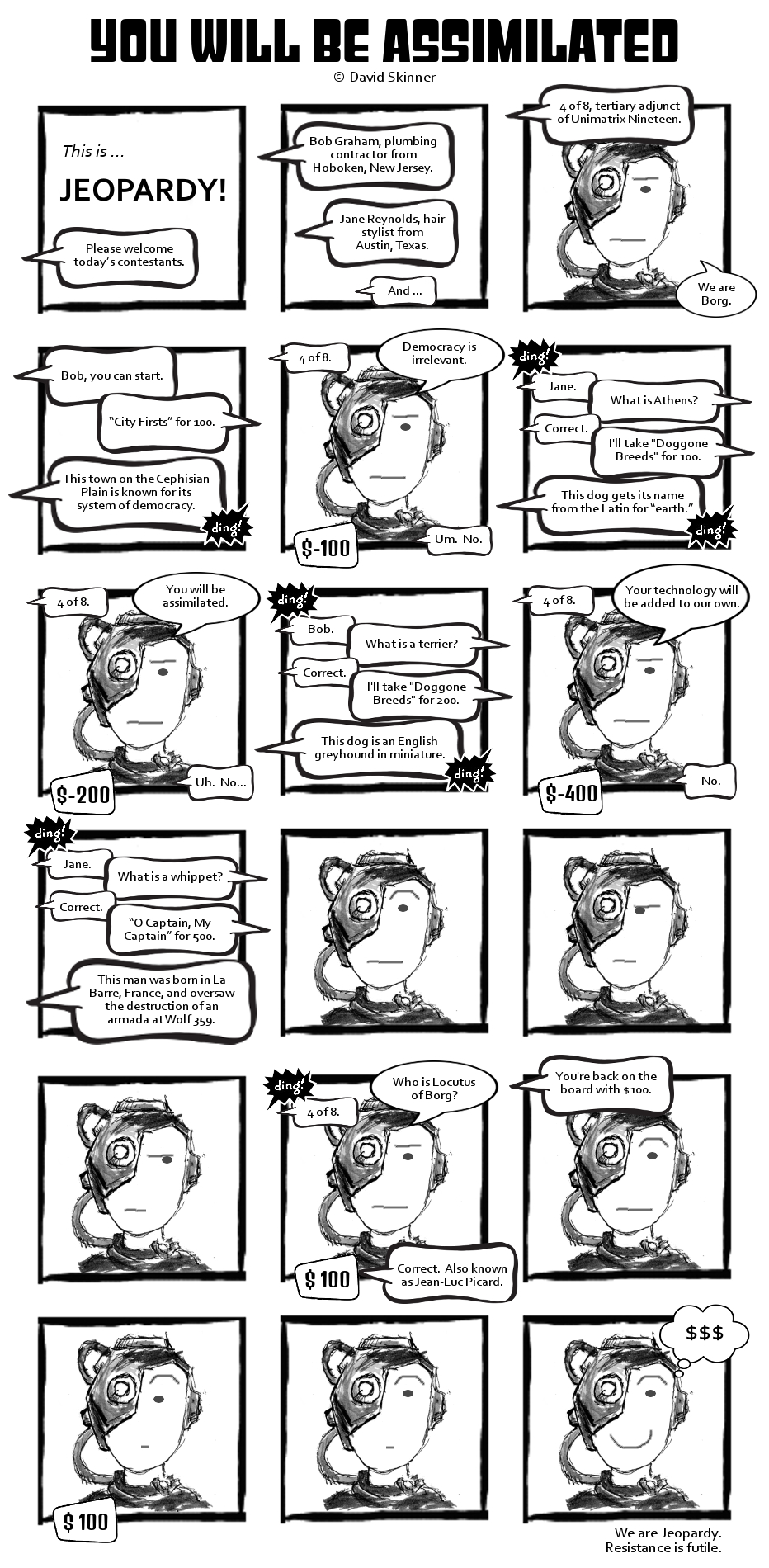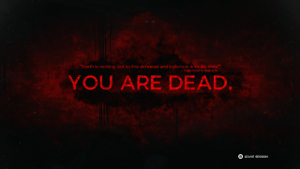You Will Be Assimilated
My Career as a Cartoonist
Tuesday, May 12, 2020 10:33 pm
Recently I noted that I have, on occasion, attempted to make clever-funny comics. Prompted by that note I have finally finished a certain comic, the rough pencil sketch of which has been stashed near my desk for years.
Since there is a lot of talking in the comic, I didn't directly ink the text. The text and layout and so on were done on PC (in GIMP). I did draw the one character, in ink and water (using nib and brush). I then scanned the drawing and integrated it with the layout.
My scanner is so old — an Epson Perfection 1200U — that a driver hasn't been released since Windows XP. Luckily I can use one of the later Epson drivers, although there's a bit of jiggering to do so. I thought it was already installed on my PC but apparently my Windows 7 64-bit forgot it was there, and I had to reinstall. Bothersome.
To keep the comic legible I had to make it too big to fit in the normal column of this blog. The image will overlap to the right but should be fine on most browsers. If not so on yours, download the image (via right-click) and view it elsewise.
Enjoy!
Since there is a lot of talking in the comic, I didn't directly ink the text. The text and layout and so on were done on PC (in GIMP). I did draw the one character, in ink and water (using nib and brush). I then scanned the drawing and integrated it with the layout.
My scanner is so old — an Epson Perfection 1200U — that a driver hasn't been released since Windows XP. Luckily I can use one of the later Epson drivers, although there's a bit of jiggering to do so. I thought it was already installed on my PC but apparently my Windows 7 64-bit forgot it was there, and I had to reinstall. Bothersome.
To keep the comic legible I had to make it too big to fit in the normal column of this blog. The image will overlap to the right but should be fine on most browsers. If not so on yours, download the image (via right-click) and view it elsewise.
Enjoy!
Derivative of Nictzin Dyalhis
Writing Another Chronicle of the Venhezian Heroes
Monday, May 4, 2020 10:11 pm
Somehow I became aware of The Sapphire Goddess: The Fantasies of Nictzin Dyalhis, a collection published by DMR Books in 2018. It collects all the fantasy stories of the unprolific Nictzin Dyalhis, who wrote primarily for Weird Tales between 1925 and 1940.
Two of Dyalhis's contributions to Weird Tales are science fiction: When the Green Star Waned (April 1925) and its sequel The Oath of Hul Jok (September 1928).
Two of Dyalhis's contributions to Weird Tales are science fiction: When the Green Star Waned (April 1925) and its sequel The Oath of Hul Jok (September 1928).
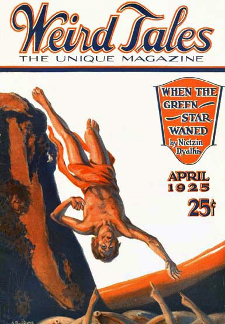 |  |
24-Hour Bacon
My Career as a Cartoonist
Sunday, May 3, 2020 4:02 am
Many thousands of years ago, given that I have something of a talent for art and (maybe) for humor, I tried making some clever-funny comics. Not many have survived. I unearthed this one an hour ago. It was drawn with ink and brush. There was a bit of photo-duping and keylining (e.g., you can see that the frame outlines are all the same). It's amusing.
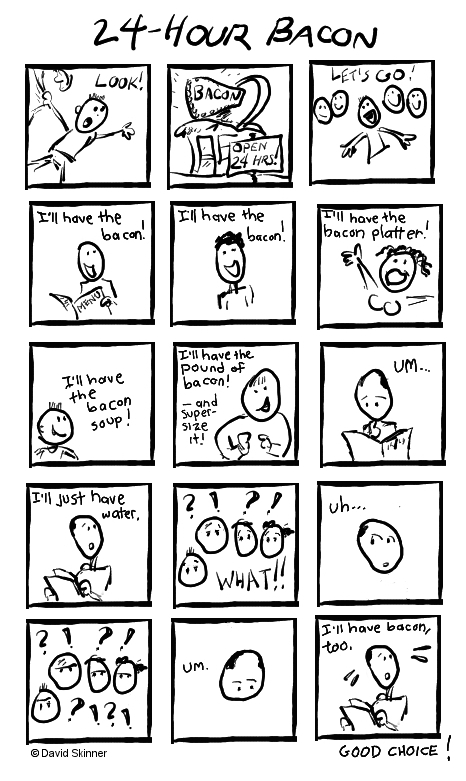

StoryHack #6 Is Out
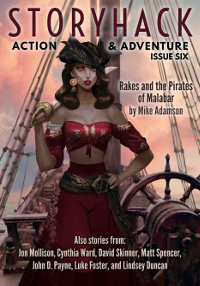
Buy it on Amazon (to give the publisher money). Review it on Amazon (to increase its rank). Read my story Due a Hanging and be amazed by my excellentivity. Go, now!
P.S. Canada speaks! A reader from Canada, in reviewing this issue of StoryHack, has this to say about my offering:
Read My Story in It!
Wednesday, April 1, 2020 1:53 pm

Buy it on Amazon (to give the publisher money). Review it on Amazon (to increase its rank). Read my story Due a Hanging and be amazed by my excellentivity. Go, now!
P.S. Canada speaks! A reader from Canada, in reviewing this issue of StoryHack, has this to say about my offering:
David Skinner wrote a punchy and brilliant story in Due a Hanging. Giving the reader just enough information to tug them along and explain his world, you get a strong feeling for the web of revenge closing in, and the tension of the events. A terrific example of show don't tell.Thanks, Canada!
A Damn Fine Experience
 I don't really play intense video games these days. Mind you, I'm hardly a filthy casual; but I am fussy. More than that, I suppose, I've fallen somewhat into Gaming as Macramé, in that I just want to fight some things for an hour, rank up my adventure dolls, and not worry too much about campaigns and bosses and the like. Hence my recent years-long bouts of Guild Wars 2 and Warframe.
I don't really play intense video games these days. Mind you, I'm hardly a filthy casual; but I am fussy. More than that, I suppose, I've fallen somewhat into Gaming as Macramé, in that I just want to fight some things for an hour, rank up my adventure dolls, and not worry too much about campaigns and bosses and the like. Hence my recent years-long bouts of Guild Wars 2 and Warframe.
I can't even seem to play the two DLCs from Witcher 3, one of my very favorite games. I did enjoy the recent Doom but I'm not excited for Doom Eternal (mostly because the aesthetic is so unhellishly colorful and carnival-like).
Anyhow, I heard about Remnant: From the Ashes, and even though people said it was a Dark Souls clone (that is: brutal to the player), I gave it a try.
Thoughts on Remnant: From the Ashes
Tuesday, March 31, 2020 5:06 pm

I can't even seem to play the two DLCs from Witcher 3, one of my very favorite games. I did enjoy the recent Doom but I'm not excited for Doom Eternal (mostly because the aesthetic is so unhellishly colorful and carnival-like).
Anyhow, I heard about Remnant: From the Ashes, and even though people said it was a Dark Souls clone (that is: brutal to the player), I gave it a try.
The Animals Agree With Me
Warning: Contains rhetorical employment of naughty words.
A scientist should be clear-eyed. Unfortunately, a human cannot interpret without bias. Especially nowadays, when ideologies demand things contrary to common sense, not a few scientists skew what they see to advance what they want.
I saw a lecture on YouTube in which a scientist, rather preciously, winked and nudged at the audience as he talked, expecting us to discover, in his animals stories, the usual current-year shibboleths: that homosexuality is not unnatural and that females are just better than males.
Your Ideology Is Showing, Dear
Wednesday, February 19, 2020 2:34 pm
A scientist should be clear-eyed. Unfortunately, a human cannot interpret without bias. Especially nowadays, when ideologies demand things contrary to common sense, not a few scientists skew what they see to advance what they want.
I saw a lecture on YouTube in which a scientist, rather preciously, winked and nudged at the audience as he talked, expecting us to discover, in his animals stories, the usual current-year shibboleths: that homosexuality is not unnatural and that females are just better than males.
Close to the Heart
On the Occasion of Neil Peart's Death
Thursday, February 6, 2020 3:26 pm
While it is not unreasonable to wonder about the life of an artist — or even to admire an artist's everyday conduct — I am of the mind that the artist does not matter (beyond his getting the proper credit and payment). To be sure, his life is relevant insofar as it clarifies his work; but other than that...
Most artists are scum. Beethoven was a bitter bastard. Shostakovich was a pathetic collaborator. As men, neither merits celebration. Celebrity for artists should be rejected. Go ahead and admire Haydn because he was kind, pious, and hard-working; then pity and decry him because he was adulterous; but remember that there were many kind, pious, hard-working, and adulterous men in the world. It was not Haydn's life that distinguished him; and it is not his life that should concern us.
Most artists are scum. Beethoven was a bitter bastard. Shostakovich was a pathetic collaborator. As men, neither merits celebration. Celebrity for artists should be rejected. Go ahead and admire Haydn because he was kind, pious, and hard-working; then pity and decry him because he was adulterous; but remember that there were many kind, pious, hard-working, and adulterous men in the world. It was not Haydn's life that distinguished him; and it is not his life that should concern us.
© 2004-26 David Skinner · All rights reserved
